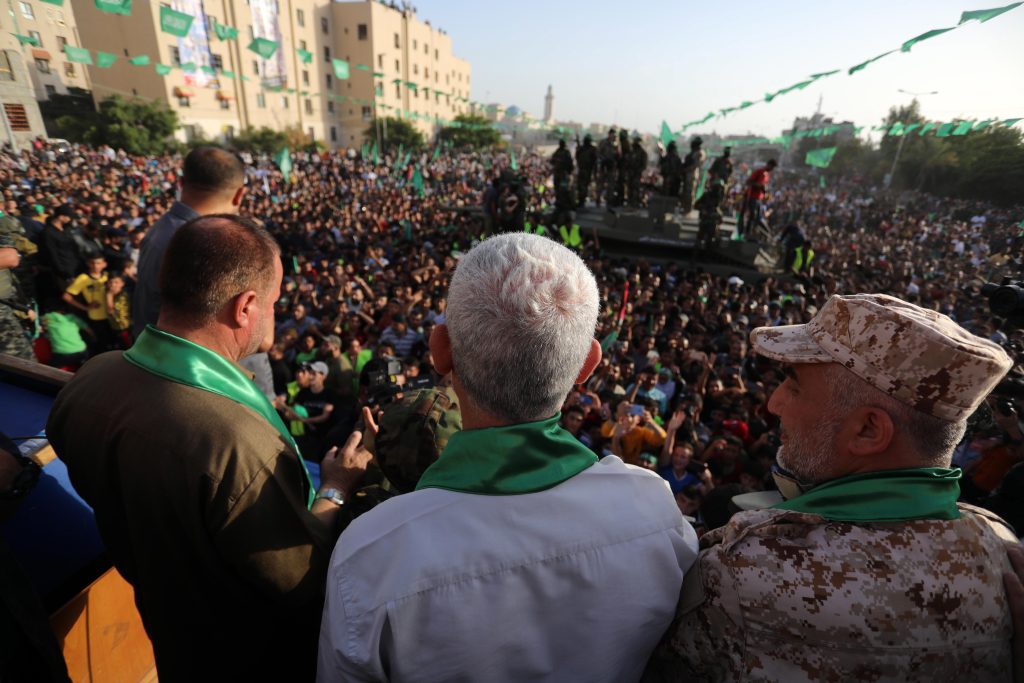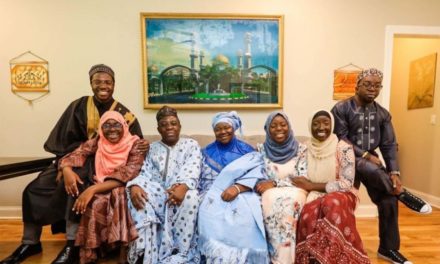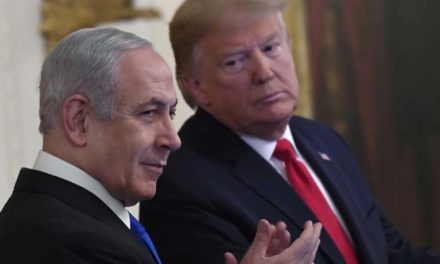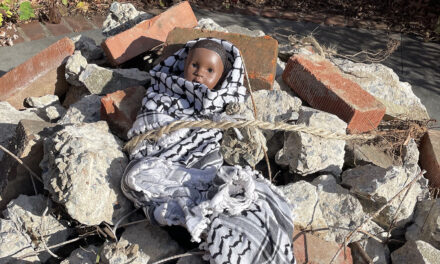Yahya Sinwar at a rally in Beit Lahia in the northern Gaza Strip, May 30, 2021. (Photo: Ashraf Amra/APA Images)
When the Israeli soldiers believed they had found Yahya Sinwar’s body lying before them, they rushed to release the photos. Here, at last, was the image of victory, a portrait of conquest and proof of Israel’s power to reach its enemies and strike down its most determined adversary. In their rush to declare the capture of their cherished prize, the soldiers didn’t appear as conquerors but as a motley assembly of tribal marauders, gathering around the lifeless body of a fallen enemy. Their victory was not one of triumph but of desperation, of an army and a people lost in the fog of conquest clinging to the illusion of power.
Although it remains uncertain, it appears that the photo was released without prior approval and before Israel could carefully curate the narrative of his martyrdom. Despite the power of the military censor and the tight control over information, Israel rushed to leak its success, barely realizing that those images would unravel the very narrative it had spent a year constructing around the Palestinian leader and shatter his portrayal as a cynical leader indifferent to the suffering of his people. The “victory image” instead exposed the fragility of the story Israel wished to tell, designed to render Palestinian leaders diabolical and project onto them the cowardice and corruption of their own “King Bibi” and to sow divisions within Palestinian society.
The military fatigues, the keffiyeh wrapped around his face, his defiant last stand — all of this contained the essence of Sinwar’s final moment. Here was a leader who did not fall through precise intelligence or get caught in a dark tunnel surrounded by captives, as Israel would have us believe, but was slain in battle as his enemies, fearing their own deaths, fired tank shells at him from a distance rather than face him as he stood confronting their drones and machines.
Paradoxically, Israel’s image of victory was anything but victorious. Yes, they killed Yahya Sinwar, but in his death, they also exposed the cracks in their own power and the irrevocable loss of their once-charismatic militarism.
The contrast could not be more striking when we draw parallels between Israeli and Palestinian leaders. Israeli leaders fight for political survival, cloaking their ambitions in the language of an existential war, while Palestinian leaders fight tooth and nail, tethered to the soil beneath their feet, throwing sticks at drones. Israeli leaders weave rhetoric from a distance, while Palestinian leaders bleed on the frontlines. Israeli leaders send their sons to distant lands, safe across the ocean, while Palestinian leaders offer themselves and their families, finding no refuge but in the promise of resistance.
Their own newspapers describe Israeli leaders as “psychopathic,” manipulative, calculating, and indifferent even to the fate of Israeli captives. Meanwhile, Palestinian leaders have fought and died to free their prisoners. The contrast couldn’t be starker between a leadership driven by self-preservation and detached power and a leadership bound to the struggle for liberation, its sacrifices both personal and collective.
The mythic power of force
Israel believes that assassinations hold the power to dismantle resistance — that killing a leader might somehow end the struggle. Even though Sinwar was not assassinated as imagined, this myth remains anchored in the conviction that Arabs are little more than disorganized tribes poised to crumble with the death of their “sheikh.” Israel’s belief in this racist and orientalist fantasy has cost it dearly, especially when it underestimated Hamas’s strength before October 7. That same mentality conflates revenge with victory, punishment with military success, and tactics with strategic change, a mentality that assumes only Israelis build institutions and possess the capacity for creative forms of organization.
Israeli newscasters framed Sinwar’s death as a “game-changer,” revealing a mindset that underscores how deeply Israel misreads the intricate dynamics of a movement far more complex than it wishes to acknowledge.
Moreover, it hints at a deeper desire among many Israelis to signal to the right-wing forces driving the country toward perpetual war, with its increasingly complex multi-front entanglements, that the time has come for a political settlement. As Israeli protestors demanding a ceasefire and a prisoners’ exchange suggested in their chants, “You got your Sinwar, now bring our prisoners home from Gaza.”
The killing of one man, after all, has done nothing to shift the tectonic plates of the war, and it hasn’t halted Israel’s deeper commitment to expansion and ethnic cleansing. The economic decline continues, and the fractures within Israeli society remain deep and unhealed. Israel’s underlying contradictions have not disappeared, but have been exposed even more starkly, leaving Israel in a bind from which no assassination can offer a way out.
When Jared Kushner, that poster child of privilege, gleefully boasted on X that Nasrallah’s death was a monumental victory that promised to reverse the tide in the region, it offered a rare glimpse into Israel’s precarious and manufactured sense of confidence. His triumphalism betrayed a deep anxiety that has long shadowed Israeli politics, and one could almost hear the echo of a nation desperate to close the existential rupture created on October 7. But the gaping wound from that day is far deeper than any single assassination could ever mend.
In this Israel has displayed a remarkable inability to learn from history, placing a near-mythic faith in the power of force and failing to understand that history has shifted beneath its feet. Perhaps in an earlier time, under specific conditions, an assassination might have delivered the victory Israel so desperately craved, but today the calculus has changed. The old tools of covert operations, targeted killings, or even large-scale punishment campaigns no longer achieve the kind of conclusive results they once promised.
Firstly, the battlefield is no longer confined to physical terrain but has expanded into the realm of perception, where Israel’s actions expose its desperation rather than its dominance. Secondly, Palestinians and Arabs have formed social, ideological, and political organizations that outlive their leaders. While emotional attachments to specific leaders exist, the impact of a single assassination remains at best tactical. The Palestinians and Arabs have grown accustomed to the loss of their leaders, and through their protracted duel with Israel, have adjusted accordingly.
This is the case with Yahya Sinwar, whose death may have offered Israel a fleeting sense of gleeful revenge. Israel’s momentary indulgence in its grim rituals of celebration, as a nation that appears to find solace in the spectacle of death, found an occasion to rally around the myth of invincibility. But despite the fervor with which Sinwar’s death was framed, it was far from the transformative “game changer” Israel wished to project.
The child and the imagination
The life of Yahya al-Sinwar mirrors the life of the Palestinian resistance itself. Born in the Khan Younis refugee camp, where existence begins in the narrowest of alleyways, he grew up in a world where children play “Arabs and Army” — a variation of hide-and-seek that mimics the brutal reality they are destined to live. In this game, children rehearse the roles they would soon know too well: soldiers shouting and shooting, Arabs fleeing and throwing stones.
In those tight corridors, beneath the unblinking sky and the ever-present threat of the machines of death that hover above, life reveals itself not as a distant dream, but as a battlefield. Here, innocence is quickly eroded, and the struggle for survival becomes the only language left to speak. In these streets and alleyways, resistance is born and takes shape not as a choice but as a necessity etched into the lives of those for whom defiance is the only path to dignity.
Sinwar grew up as Palestinians have always grown up, constantly imagining a different world where dignity and freedom are more than distant dreams. To live under occupation is to live with the ever-present question, “What is to be done?” It haunts every step, a question asked not in abstract terms, but in the daily struggle against a reality that denies one’s very existence. There is very little time to intellectualize or theorize, and perhaps even less time to disentangle the web of relations that produces the refugee camp. For Sinwar, like so many others, this question is a guiding force, a call to action that resonated in the narrow streets of Khan Younis and beyond, shaping his life as it has shaped the lives of countless Palestinians — demanding not just survival, but the creation of a new world out of the ruins of the old.
As Palestinians grow up, some find themselves accommodating to a world that has persistently rejected them, worn down by the relentless power of Israel’s incarceration machine or its ability to kill. The weight of this machinery looms large, a force that not only imprisons bodies but stifles dreams. For some, the fear of disappearing behind bars becomes too heavy to bear, and they retreat into survival, compromising with a system that seems inescapable.
Disillusionment deepens as comrades, once bound by a shared oath and common secrets, betray the cause, choosing personal safety over collective struggle. In this fractured reality, the pull of resistance still endures, but for those who have seen betrayal and defeat up close, it is often accompanied by the bitter knowledge of what has been lost along the way. When they raise the question of what is to be done, they retreat behind closed doors or curse those who take the initiative.
Sinwar was not one of those who surrendered to fear or disappointment. He continued to play “Arabs and Army” his entire life, though the stakes were no longer child’s play. For him, the game transformed into a lifelong struggle, where the roles became real and the battlefield extended beyond the narrow alleyways of Khan Younis. The soldiers were no longer imagined, the stones no longer symbolic. He excelled at those games, exposing the soldiers for their dishonor, cowardice, and inability to fight when the machines were not there to protect them against Palestinian fire when their army collapsed like a house of cards on October 7.
Sinwar exposed the truth about Israel’s post-heroic army that only survives from a distance, shielded by armor and dependent on the excessive use of firepower. The myth of bravery and direct engagement has long been abandoned, replaced by a military that shies away from close confrontation, preferring to strike from the safety of drones, artillery, and airstrikes. In Sinwar’s last stand, this fear was laid bare—a military unwilling to face its enemy eye to eye, relying instead on distant destruction, where the risk of true combat is minimized.
Israel chose to shell a wounded fighter who had already lost his weapon, not out of necessity, but out of the pleasure of killing and the fear of facing death themselves. Rather than capture him — an act that could have yielded not only valuable intelligence but also the powerful image of a leader taken alive — Israel opted to kill the one man who could be pressured for information on its captives. In doing so, Israel sacrificed a potential strategic victory for immediate destruction, exposing the cowardice of its military machine.
This choice was no anomaly; it reflects Israel’s broader approach to the conflict — destruction over strategy, or rather, destruction and massacres as a strategy. Its method is rooted in fear and the unwillingness to confront Palestinian resistance, and where the battlefield cannot be won by force alone.
The only courage Israel shows today is the courage to wield its American-manufactured machines.
Yet the impact of Yahya Sinwar was not due to any singular power he possessed. His success lay in something far greater — a disciplined, highly organized, and competent resistance movement that had been meticulously built and sustained, even during his long years behind bars. This is why his story is not just one of personal defiance but of a collective strength that was able to bring Palestine back to the center and unsettle the empire and its managers. He reminded Israelis that Palestinians will neither yield nor submit, and that surrender is not in their vocabulary.
In response, Israel chose the path of genocide, and it did so willingly, deliberately, and in cowardice. It laid bare its childish fantasy of nation-building through destruction, of erasing a people and their history to secure its own fragile existence. In choosing extermination over reconciliation, Israel has exposed its moral and political bankruptcy, the hollowness of its narrative, and the unending resistance that will continue to rise from the rubble.
Sinwar opened the deepest void in Israel’s self-understanding, fully aware that doing so would cost him his life. The little boy from Khan Younis, who once played “Arabs and Army” in the cramped alleyways of the refugee camp, became the man who compelled Israel to confront its own fears and unravel its illusions haunted still by the question of its existence, and leading itself towards death by its own sword.
And even if Israel annihilates every last Palestinian, the world will know the truth — it was not the Israelis who won, but their machines.













